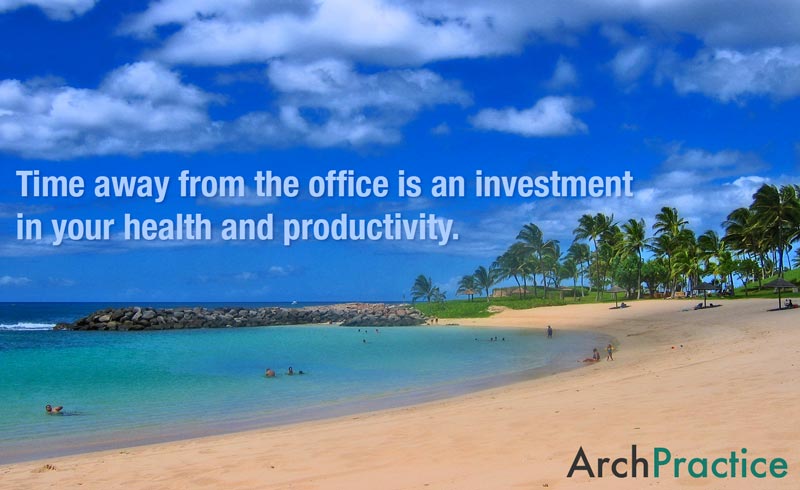Vacations are incredibly important, but many people work through their vacations and don't take full advantage of the time away to recharge. Don't be one of those people. Make sure you really enjoy your vacation so you can be healthier and more productive.
It is summer in North America, which means a lot of you will be taking vacation. Since vacations are important for recharging your batteries so you can be more efficient when you return, it is critical that you really enjoy yourself and cleanse your body of the toxic stresses that architects deal with daily.
The following tips should help you reach peak relaxation. These aren’t going to be easy, but remember that the more you recharge, the stronger you will be when you return. Do your best to follow all of the tips so you can truly get away. Don’t worry - your clients, projects, and co-workers will survive.
Don’t work extra hours leading up to your vacation
The last thing you want is to start your vacation in a stressed-out state. Travel is typically stressful by itself. Don’t increase that by leaving the office in a rush to catch your flight.
Instead, plan out the week before you leave. Check in with clients, consultants, and supervisors and ask them to help you develop a list of priority tasks that can be completed before you leave. Asking for help in prioritizing tasks should be a regular activity anyway, but if it isn’t for you, now is the time to start.
Make it a goal to leave an hour early on your last day before vacation.
Leave Things in Capable Hands
You work with capable and responsible people. (If not, then you should really rethink your situation, but that’s another article.) In addition, architecture is created by teams of people who must cover for each other during vacations or illnesses - so let them cover for you while you are away. Consider this a chance to practice delegation and flex your trust muscles.
Obviously, you may have critical or specialized knowledge about certain aspects of your projects. There usually isn’t anything so critical that it can’t wait a week or two, but occasionally there are real emergencies that need your attention. Therefore, you should give a trusted colleague information on how to contact you and they should know that the information should only be used to avoid a legitimate disaster.
You shouldn't have to put your contact info behind "break this in an emergency" glass. Rather, the person you select should be able to handle everything while you are gone without you having to worry. Choose the right person and you can rest easily knowing that everything is under control.
Turn Notifications Off
That pesky red dot that tells you how many unread emails you have in your inbox only serves to remind you of all the crazy stuff happening back at the office. The number alone is a major stressor for some people, especially as the number gets bigger and bigger as the week goes by.
Temporarily disable the notifications on your email app. And if you are one of those people who just can’t help themselves, you should seriously consider deleting your email app from your phone for the week of vacation. Don’t be the person who sits on the beach in their bathing suit glued to their cell phone.
Pay Attention and Be Mindful
While laying on the beach, put your phone away and practice some mindfulness. Take a few minutes to feel the sun on your skin, listen carefully to the waves lapping on the sand, and focus on the deep blue color of the sky. Soak it all in. Take some deep breaths and be in the moment. When you are with friends and family, stop to really enjoy their company.
You will experience deeper relaxation when you use all five senses to fully experience the moment. Mindfulness can help the stress melt away. The sun helps, too. This is your reward for following all of the preceding tips.
Vacations are Investments
Time away from the office is an investment in your health and productivity. It should help lower chronic stress and remind you that life is about more than just your work. Working vacations don’t have the same effect. We should all do our best to leave our work behind completely when taking vacations so we can continue to do great work when we return.
Finally, remember that you need to set a good example for others in your office, both those below you in the pecking order as well as those above. Taking your vacation seriously lets others know that it is ok (or even expected) to fully check out during time off. This is an investment for the firm as well as for you as an individual.
